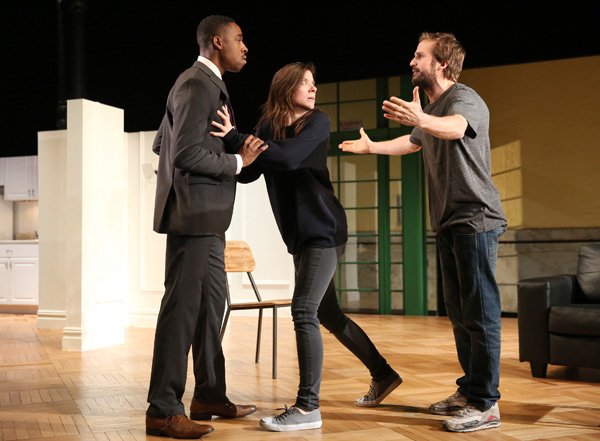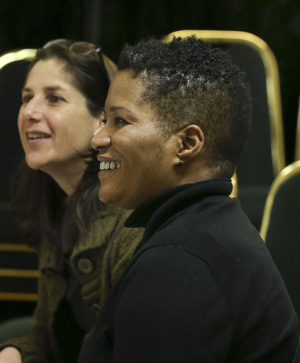Tracey Scott Wilson on Race, Class, and Gentrification in Buzzer at the Public Theater

(© Joan Marcus)
Is that intercom panel next to your apartment door a helpful convenience or the first line of defense? Tracey Scott Wilson raises this question with her provocative new play Buzzer, now showing at the Public Theater.
The story revolves around Jackson, a Harvard-educated African-American lawyer working hard to make partner at his firm. He's recently purchased an apartment in his now-gentrifying childhood neighborhood in Brooklyn. His white girlfriend, Suzy, moves in along with Jackson's friend Don, a recovering addict. Tensions flare as the three housemates wrangle with identity, community, and an unspoken fear of what's lurking just outside the front door.
Wilson spoke with TheaterMania about the New York City debut of Buzzer (it was previously produced at Chicago's Goodman Theatre and Pillsbury House Theatre of Minneapolis) and what it means to be presenting this story in front of an audience that may very well be living it in real life.

(© Tammy Shell)
Gentrification is often presented in starkly racial terms. Why was it important for you to present the story of an upwardly mobile black man contributing to the gentrification of his childhood neighborhood?
Because it's something I've done. I grew up in Newark. It was a rough neighborhood. Now that neighborhood is slowly gentrifying. When I moved to Brooklyn it was to neighborhoods that were becoming gentrified. I've seen all sides of it. It's more complicated than just white people moving in. I wanted to explore it through relationships. There are complicated reasons for it and the conflicts that arise.
You lived in Crown Heights. How did that inform the writing of this play?
I was living there when I wrote it. As I said, I grew up in Newark, but my father was a minister. He was very strict on us. We had to speak proper English and carry ourselves in a certain way. At the same time, I was familiar with being in a tough neighborhood and how to handle myself. I was friends with people in Newark. When I got to Crown Heights, I was an outsider. It was very emotional for me to be treated as an outsider by people who I thought of as my community. I also didn't like some of the things people were doing in my community. I had a lot of reactions to all of it.

(© Joan Marcus)
There's a lot of angst in this play about a group of guys who hang out on the corner. What is the role of fear in this story?
Fear is something that is not spoken about. Not having the language to talk about that fear only exacerbates it.
"The unspoken" seems to be a theme here. In a talkback for Buzzer at Chicago's Goodman Theatre, you said, "Our conversations about race have become much more limited. Everyone knows what not to say…but we don't know how to say the things we need to say." How have we as a society gotten into that position?
The way social media works plays a huge part in it. I'm no fan of Sarah Palin, but I do think that when Katie Couric was interviewing her and Palin said, "You're just trying to get me," that was exactly right. So much of our culture is about "getting" people: getting the embarrassing e-mail, the embarrassing quote, the secret phone call where someone says extreme things — then throwing it on the Internet and saying, "See, you're a racist! You're a bad person." That's easier than actually stepping back and looking at an issue from a geopolitical and economic point of view. Because that's more complicated, right? It's easy to point to someone and say that individual is a racist; it's really hard to say, "Our system is f*cking broken."
Has the play evolved since previous runs?
When I finished in Chicago I thought I was pretty much done. I really thought this whole process was going to be easy-breezy. To my great surprise and delight, I ended up making a lot of changes. I had a new director and actors. I'm in New York City. That's given me a different perspective.
Why do you think this process of gentrification is particularly fraught in New York City?
New York has a very unique economic situation. We find ourselves on this tiny island with very poor people living next to very rich people. It's this constant desperation for real estate. It's almost impossible to find a rent-stabilized place anymore.
How has working with the director, Anne Kaufman, influenced the play?
She's one of the smartest directors I've ever worked with. Dramaturgically, she's so attentive and on-point. I was actually surprised how much I hadn't noticed in my own script. We ended up condensing three scenes into one. It makes for a much better play.
Are you anxious to present this story to a New York audience that might actually be living variations of this story in their own lives?
Yes. I'm always anxious to show anything in front of a New York audience. It's a tough crowd. I'm not getting much sleep.










